Category: NYF News
New US Executive Director: Ryan Walls!

Dear NYF Friends,
It’s hard to believe October is already half-gone! We feel like we were celebrating Founder’s Day together only a few short weeks ago.
Now the Nepali festival season is upon us. In the first week of October, families all over Nepal gathered to celebrate the most auspicious festival of the year, Dashain. During this time, young people received blessings of abundance from their elders. They also enjoyed wonderful traditions like colorful processions, kite flying, seasonal games, bamboo swings, fairs, carnivals, and delicious feasts. Gifts were exchanged and many wonderful memories were made as well.
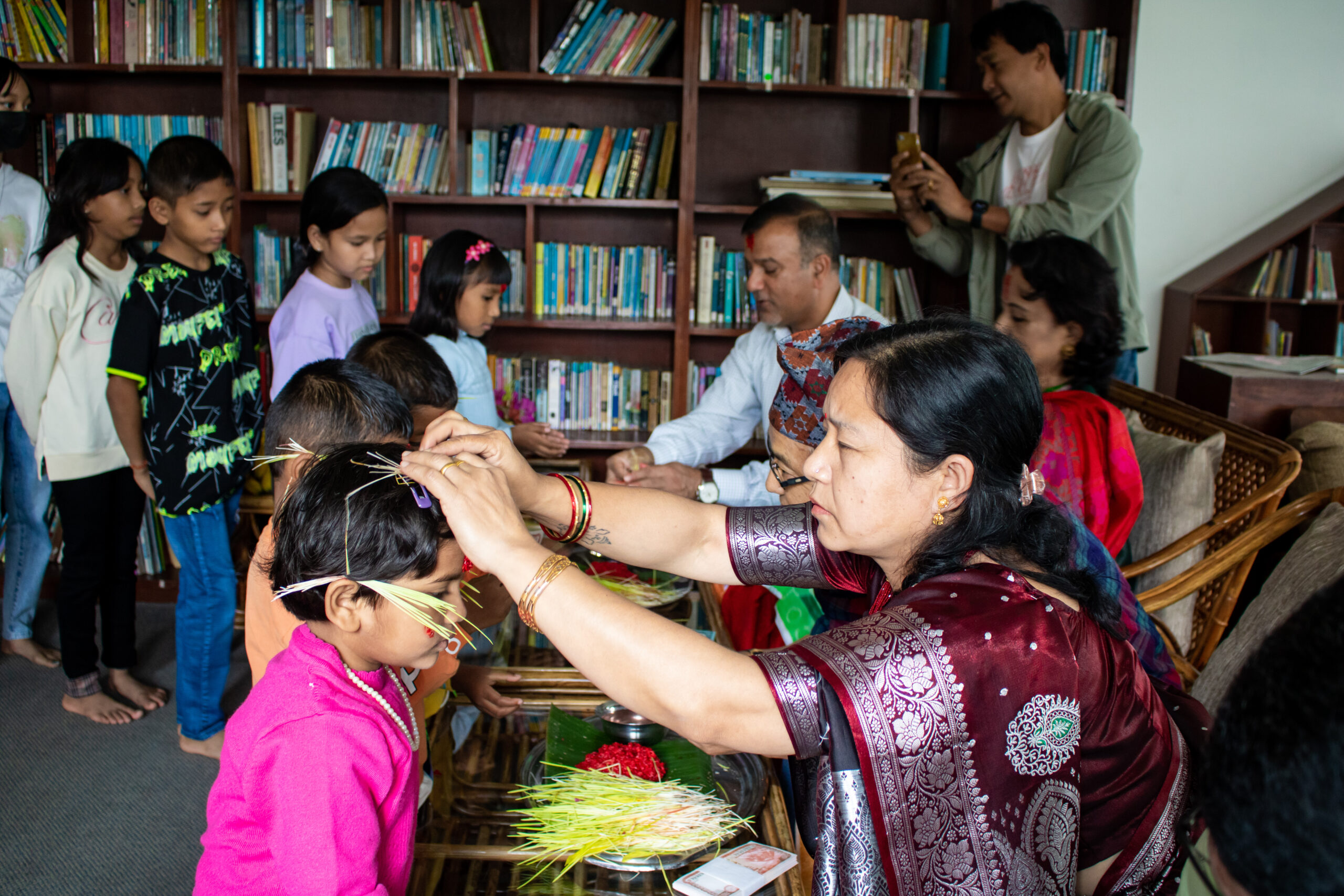
And Tihar is right behind! This festival begins this upcoming weekend. Tihar gives Nepalis the opportunity to celebrate valuable relationships like those between mankind and our canine friends—as well as between sisters and brothers.
In Nepal, this time is all about honoring and strengthening important, loving, constructive relationships.
That’s why we think this is such a lucky moment to be announcing the arrival of our new U.S. Executive Director, Ryan Walls!
Ryan Walls will officially start here at NYF on October 24th, 2022, but we can hardly wait to begin our journey together! He has impressed everyone on the Board and on the U.S. team, plus Som, not only with his background, but also with his enthusiasm for the work we do and his approach to teamwork.
We’ll be sharing more about Ryan soon, but suffice it to say that we’re confident we’ve found a great fit for NYF. Most importantly, we think our NYF Community will really like him.
“We are delighted with the selection of Ryan J. Walls as our new U.S. Executive Director. Ryan brings a wealth of experience from the non-profit sector with a reputation for working collaboratively and getting things done. He will certainly be a welcome addition to the NYF family!”
Chris Heffelfinger, NYF Board Chair
Olga is super-excited.
And it’s not just because Ryan is an experienced non-profit leader who is collaborative, personable, and smart, but also because he loves Nepal and the Nepali people in particular. Ryan has spent time living in Nepal and visiting as a traveler. He describes his time there as “a formative experience which shaped his worldview.” Olga knows this devotion to Nepal and its people very well, so she is undoubtedly thrilled to have found a new Executive Director who shares her personal love for this remarkable country.
Som agrees that Ryan’s prior connections to Nepal are an added advantage that provide an instant connection to NYF and the work we do. He is also very impressed with Ryan’s dynamism, positive-thinking, and deep desire to work for the children and youth of Nepal. He is especially looking forward to partnering with Ryan as the Caste Equality Project gathers steam in the coming years and continuing to build on the collaborative spirit across NYF’s global community!
Welcome aboard, Ryan Walls!
With best wishes for a joyful autumn,
Som Paneru, Olga Murray, NYF staff, and our Board of Directors
P.S. Keep an eye on our social media because we’ll be posting updates about Ryan’s first days! Additionally, there’ll be highlights from the Nepali festivals at Olgapuri!
Happy 6th Anniversary, Olgapuri Children’s Village!

On September 25, 2016, NYF formally inaugurated Olgapuri Children’s Village—a beautiful, permanent home for children in Nepal whose family members are unable to care for them. When it opened, we were hopeful that it would be everything we dreamed of: a remarkable place full of love, empowerment, and growth.
Here we are in 2022, celebrating the start of Olgapuri’s sixth year of operation. With each year, we’ve made the village even better than it was before. It has truly become everything that we had hoped it would be. And it’s all thanks to the NYF Community. Dhanyabad!
“We have designed these facilities thoughtfully and generously to provide them [the children] with ample comfort so that they can live their lives with dignity, self-esteem, and joy.”
Som Paneru, NYF President. 2016, Inauguration Ceremony at Olgapuri Children’s Village
Happy Olgapuri Day!
September 25 is known as “Olgapuri Day.” Every year, children, staff, and community members celebrate the anniversary of the opening of Olgapuri Children’s Village with delicious food, fun games, lots of dancing, and more. It’s one of the many events that the children enjoy throughout the year.
It also happens to be a great time for us to reflect on all that’s happened that year at Olgapuri. And in 2022, there’s so much to celebrate!
Special Highlights at Olgapuri in 2022*
- Ninety-two children lived at Olgapuri (but no more than 80 at a time). Among them, 14 were new children who were warmly welcomed by the Olgapuri family. Meanwhile, fourteen young adults graduated the 12th grade and moved out of Olgapuri (into dormitories or hostels for college or vocational training). Three kids were able to return to their families due to improved circumstances at home.
- Every student successfully moved forward into the next grade! Due to COVID-19, children at Olgapuri attended online classes until December 2021. They returned to in-person classes in January, and their academic calendar is now back to normal.
- Two young graduates secured the highest scores in their respective schools, ending high school as valedictorians and moving directly into their bachelor’s degree programs. One is pursuing a degree in business at the Ace Institute of Management in Kathmandu, and the other is enrolled in a five-year undergraduate program in law at Kathmandu School of Law.
- New activities were introduced to interested kids, including yoga, meditation, and self-defense classes. Many students report that these extracurriculars are not only fun but are also helping them to focus on their studies!
- Counselors and house parents worked closely with the children to ensure that their anxiety, curiosity, and other challenges (especially related to the pandemic) were addressed appropriately.
- The ‘Olgapuri Children’s Club’, run by the kids themselves, organized fun events like art exhibitions, carnivals, and music shows. At Tihar in early November 2021, they organized an incredibly successful virtual Deusi-Bhailo** event to broadcast through Facebook Live. The Children’s Club used their Deusi-Bhailo to raise money for club activities. They raised the equivalent of $600!
- The children celebrated many special days together—including Dashain, Tihar, the winter holidays, Holi, and their annual communal birthday party—with cake, presents, Tika blessings, campfires, and more.
Looking ahead…
As we move through the end of 2022, the children at Olgapuri are looking forward to celebrating Dashain and Tihar. These two Nepali holidays are full of gift-giving, loving moments of laughter, and joyful memories. They signify a time of warmth and close connection between communities and families.
Thank you so much for your support!
Generosity from friends like you are allowing the Olgapuri kids to grow up safe, nurtured, loved, and supported—part of a unique family system that will always be there when they need it. Thank you.
*Between July 2021 and June 2022.
**Deusi-Bhailo is a beloved Tihar activity practiced in Nepal and some parts of India. Groups of children travel from house to house, singing two special songs: Bhailo sung by girls, and Deusi sung by boys. The singing is accompanied by dancing. After the performance, those in each house give snacks, sweets, and money to the children, and the children give blessings for prosperity in the coming year.
Dadeldhura Nutritional Rehabilitation Home Officially Joins the Nepali Hospital System!
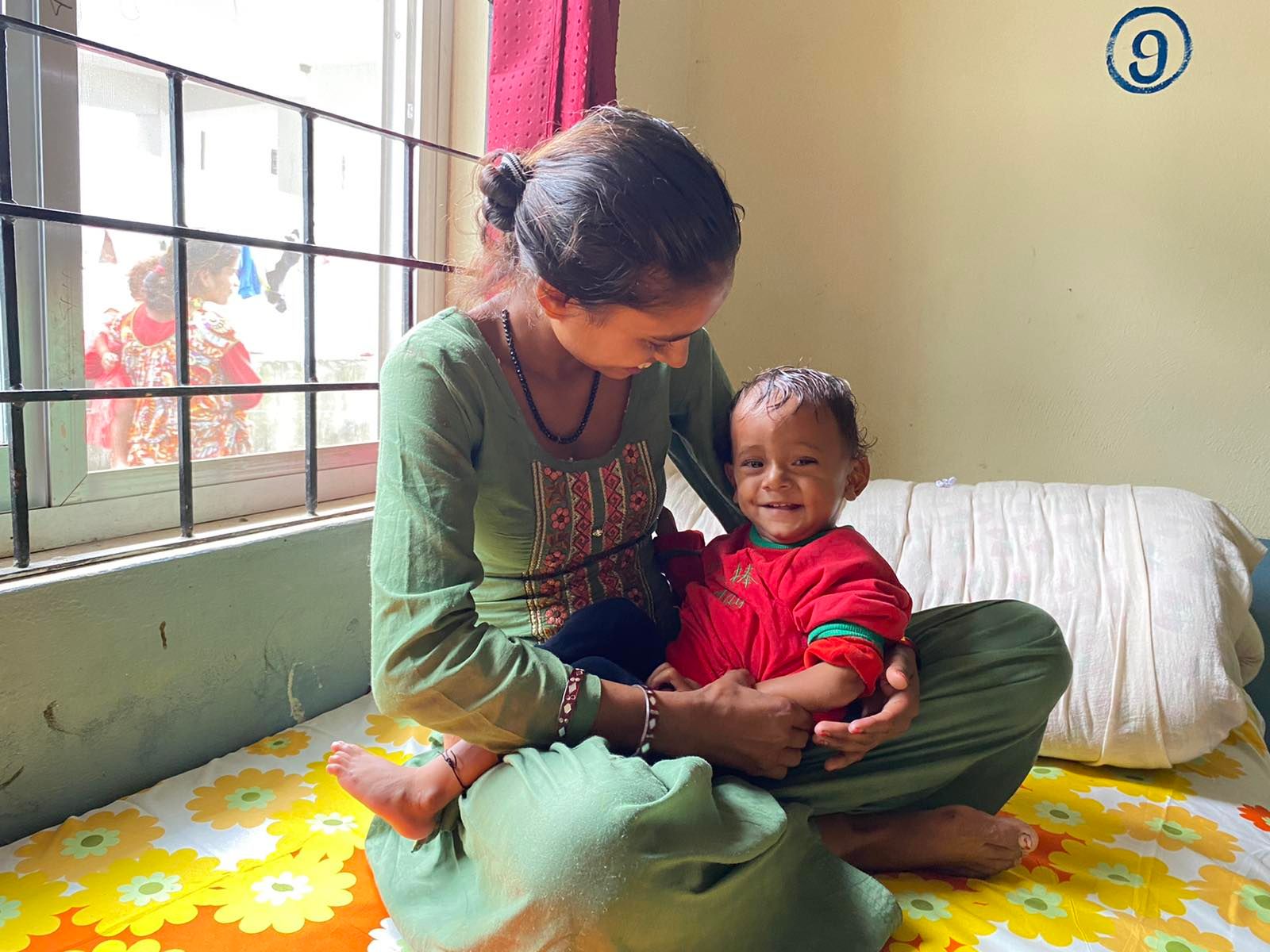
Exciting news! On July 26th, 2022, the Dadeldhura Nutritional Rehabilitation Home was formally handed over to the government-run Dadeldhura Hospital in a special ceremony. This marks the successful conclusion of NYF’s work building and launching new Nutritional Rehabilitation Homes—a project that began in 1998.
NYF’s pioneering NRH model has been so successful that it has become a central piece of Nepal’s national work to end childhood malnutrition. Indeed, the government has already built an additional seven facilities throughout the country—with more on the way! Read more about these remarkable facilities here.
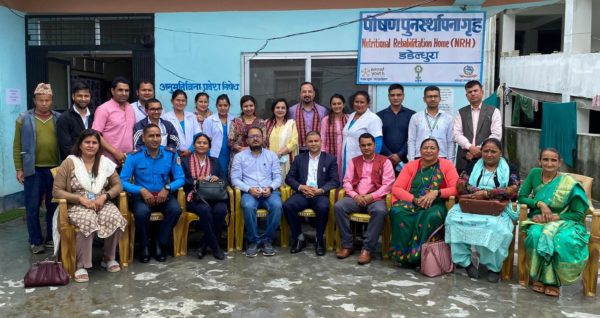
About the Dadeldhura Nutritional Rehabilitation Home
The Nepali government specifically requested the Dadeldhura Nutritional Rehabilitation Home because the children in Dadeldhura District and in multiple adjoining districts were experiencing a very high rate of stunting due to malnutrition. They had identified several of these districts as among the lowest performing in Nepal when looking at rates of stunting, anemia, and low weight in children and mothers of reproductive age.
Mothers in the region were undoubtedly eager to help their babies grow and develop into healthy, active kids and strong, creative young adults. But in many of their households, there’s no room in the budget for empty calories.
Every rupee spent on food is a rupee that can’t be spent on other necessities like rent, medicine, and school. Without access to knowledge about nutrition—what vegetables contain the nutrients kids need and how to combine and prepare foods to maximize nutritional value—mothers can only make their best guesses with the resources they have.
Many of these parents have shared stories of feeling heartache as they watched their children struggling to put on weight in spite of the adults’ best efforts.
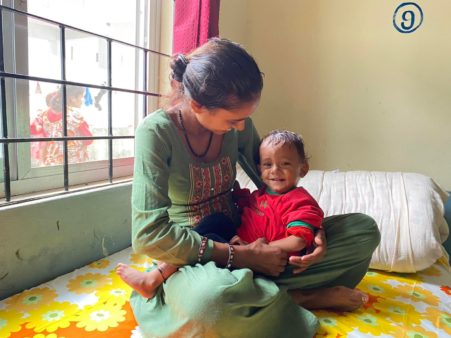
Nepal’s government hoped that one of our clinics would provide the medical support and educational resources nearby communities needed to begin reversing this trend.
This 10-bed facility (enough for 10 mother-child pairs) would be NYF’s final NRH construction project—the 17th such clinic we had built. We completed construction in August 2017 and started operating on September 1st of that same year.
Achievements at the Dadeldhura Nutritional Rehabilitation Home
In the five years since this clinic opened its doors, nine specially trained staff members have made the Dadeldhura Nutritional Rehabilitation Home a pride of the associated hospital. Here are some of their achievements:
- They provided residential treatment and care for 477 children—including diet therapy, 24-hour nursing care, medical check-ups by a pediatrician, and careful monitoring. During these stays, their caregivers, usually mothers, received hands-on training on practical nutrition education and personalized counseling on how to maximize the nutrition in their home diets using only the ingredients available to them.
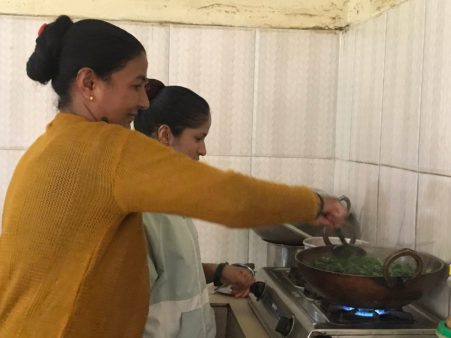
- They’ve conducted nutritional screenings (and provided personalized nutritional counseling for moms!) for 2,266 children who were visiting the Dadeldhura Hospital for other ailments when malnutrition was a contributing factor.
- Despite not having a designated field staff, NRH staff managed to conduct 56 home visits to follow-up with discharged children who had been severely malnourished enough that their cases required prolonged monitoring.
- They provided community outreach and educational events for their surrounding communities whenever it was necessary, including Breastfeeding Week, Iodine Month, and Nutrition Week.
During the COVID pandemic:
- During COVID-19, They conducted an additional 113 follow-up visits over the phone, coaching caregivers on practical nutrition tips, home hygiene, and child health care at home.
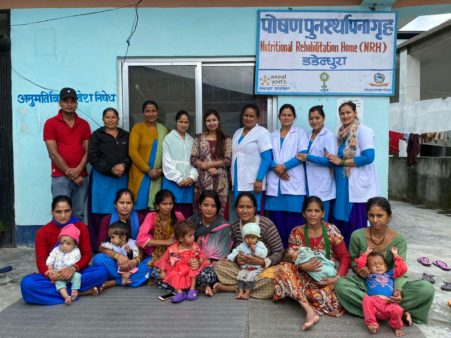
Trainings and Assessments
Staff members have been eager to continue learning to best serve their young patients. Not only have they all participated in annual “refresher” training through NYF’s Kathmandu Valley flagship NRH, but they’ve also made efforts to specialize by attending trainings held by the Nepali Ministry of Health. Several nurses have also attended a maternal and young infant child nutrition workshop. Others have participated in trainings focused on preventing mother-to-child transmission of HIV/AIDS. Most recently, a nurse attended a 5-day workshop on “Nutrition in Emergencies,” focused on learnings from the COVID pandemic.
In 2021, a government team conducted an assessment on the full Dadeldhura Hospital. The NRH scored highest among all the clinical settings associated with the hospital.
This incredible work will continue, with NYF still providing follow-up training for NRH staff members across the country. This includes those providing transformative services in Dadeldhura. In fact, we’re providing training for NRH staff members at facilities built entirely by the Nepali government! This training takes place at our flagship Kathmandu Valley NRH, led by our incredible Nutrition Coordinator, Sunita Rimal.
New Opportunities in Childhood Nutrition
Nepal, NYF, and other organizations working to combat childhood malnutrition have made tremendous strides over the 24 years since we first began providing holistic nutritional care. But the work isn’t finished.
At NYF, we strive to design programs that can one day be sustainably taken over by the communities they are serving. This keeps us at the forefront of social innovation in Nepal—focusing our attention on developing new, focused, daring programs that respond to the toughest challenges.
With the Nepali government now building and operating NRHs on its own, NYF’s nutrition team sees new opportunities to conduct life-saving Nutrition Outreach Camps in more and more remote regions of the country.
As Nepal works to improve its nationwide infrastructure, it must contend with its unique, dramatic geography. Sharp elevation shifts throughout the country make building and maintaining roads and bridges incredibly difficult. As a result, many villages are still only accessible on foot. Historically, we’ve struggled to persuade some parents to bring their severely-malnourished children to the nearest NRH, as the journey to the closest one was often several days long and potentially dangerous.
Now when we find children in these areas in need of immediate medical care, there’s an NRH within much closer reach than there has ever been before. That makes it so much easier to save more lives and introduce nutritional education to eager communities.
Thank you!
Thank you so much for being part of this journey. We are so grateful to everyone who has helped make this chapter of NYF’s journey such a transformative success—not only for the individual children we’ve nourished, but for the country as a whole.
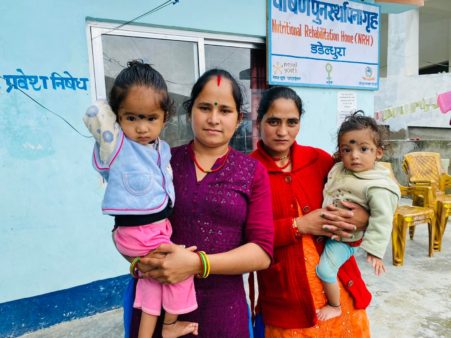
Donate Today
As Nepal recovers from the COVID pandemic and finds a “new normal”, NYF is hard at work launching new initiatives, keeping our promises to those already in our care, and integrating new learnings from the past two years. Please help us continue to grow our impact by making a generous gift today right here on our website!
Make-A-Will Month
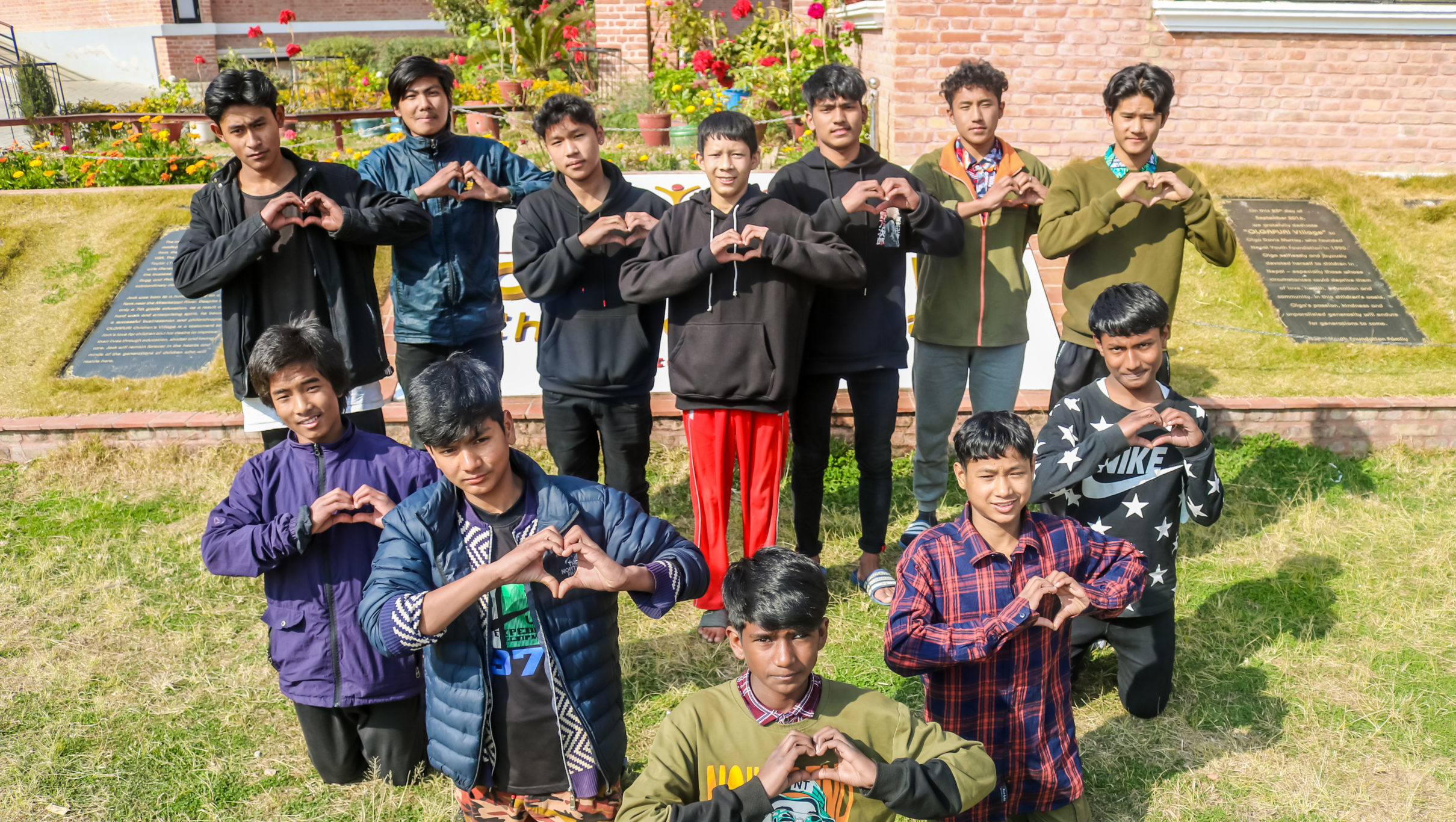
National Make-A-Will Month began on August 1st. Have you drafted or updated your will and estate plans recently? No matter where you are in your life, now is the perfect time for this important task!
Estate planning isn’t just about money. It’s about love and peace of mind. Whether you’re 18 or 80, having an up-to-date will is the best way to protect yourself and your loved ones.
In your estate plan, you decide, in detail, how to distribute your assets and property. This includes not only items like stocks, homes, vehicles, cash, and jewelry, but digital assets and pet care as well.
Including NYF or another nonprofit in your estate plans
Including a nonprofit in your estates plans like your will and/or as a beneficiary of your accounts can be as simple as adding a single sentence or amendment to your will.
Leaving part of your estate to a nonprofit is also great way to reduce estate taxes for your heirs.
Popular ways of making these planned gifts include leaving a specific amount, leaving a percentage of a donor’s total wealth, or designating the remainder of a donor’s estate after other bequests have been paid. Additionally, if you decide to designate a charity as a beneficiary, it doesn’t have to be all or nothing. You can always decide to leave any percentage you wish to one or multiple charities.
See below for more information about the different ways you can include NYF (or other charities) in your estate plans:
- Planned Giving Through Your Will
- Planning Giving Through Charitable Trust
- Planned Giving with Retirement or Insurance Funds
The Legacy Circle
When you include NYF in your estate plans, you will automatically be invited to join our Legacy Circle!
The Legacy Circle is NYF’s way of saying Dhanyabad, or Thank You, to those who remember us in their estate planning. All you need to do is let us know when you’ve included us in your will or other plans—no minimum bequest required—and you become part of this special group.
Bequests and other planned gifts make an incredible difference for nonprofits like NYF. Indeed, these generous remembrances help bolster organizations like ours through unexpected disasters like earthquakes and pandemics. They truly allow us to maximize impact for the children in our care.
These special donors mean the world to the NYF team. It is a profound honor to be included in a long-time supporter’s estate planning. What a joy to know that our programs in Nepal can continue providing Education, Health, Shelter and Freedom for children in Nepal for years to come!
Don’t know where to start? Try FreeWill.com!
Whether you are starting your very first will or simply reviewing your existing plan, we hope you set aside time during the month of August to consider these impactful plans. FreeWill.com is an excellent, nonprofit-friendly place to start!
FreeWill’s user-friendly interface helps you create a real, legally-binding will based on your state and your unique circumstances. It’s also completely free. They may even remind you of an asset you’ve forgotten to include!
NYF Launches Phase I of Caste Equality Project: Educating Dalit Lawyers

We are so thrilled to officially announce the launch of Educating Dalit Lawyers (EDL), the first phase of NYF’s Caste Equality Project! Educating Dalit Lawyers is an enriched law school scholarship for graduating Dalit high schoolers aiming to become human rights lawyers.
In partnership with Dignity Initiative, a Dalit-led NGO based in Kathmandu, NYF will provide incoming law school students with full-ride scholarships through five years of law school at some of Nepal’s best colleges. We’re also excited to provide accommodation and food stipends; extracurricular, mentorship, and leadership opportunities; and internship placement support.
As of now, we have received over 100 applications from hopeful students from all seven of Nepal’s provinces. Applicants come from a strong mix of male and female candidates, with individuals coming from a wide variety of Dalit subcastes.
Our team will select 20 students who will come to Kathmandu to prepare to take Nepal’s rigorous law school entrance exam. The top 15 students will receive the full scholarship.
Your Support
Join us in launching NYF’s most daring program yet! NYF is currently raising funds in support of Educating Dalit Lawyers. One year of support for each student in this program costs approximately $4,000. To support these determined students, please donate now.
Timeline
July 2022 – Testing Prep
20 promising students are selected from applicants from all over Nepal and brought to Kathmandu to attend prep classes for the competitive law school entrance test. All expenses are paid.
Aug. 2022 – Law School Entrance Exams
Sept. 2022 – Selection & Mentorship
The top 15 students are selected for the full 5-year scholarship. As they receive acceptance notification from law schools, NYF facilitates housing, enrollment, and other logistical matters. Courses begin. Each student is matched with a human rights lawyer mentor.
Winter 2022 – First Semester!
As classes get underway, NYF works with Dignity Initiative to organize special program features like advocacy trainings, leadership activities, workshops, celebrations, and more. These activities dovetail with law school, enhancing it without interrupting it.
Spring 2023 – A New Start
NYF releases the 2nd year’s call for applications across the country, committing to select an additional 15 law school students.
Summer 2023 – First Annual Dalit Law School Student Conference
NYF, Dignity Initiative, and our scholarship recipients hold a networking conference for Dalit law school students across Kathmandu, creating an opportunity to make connections, present learnings, share personal stories, and more while practicing skills like public speaking.
2027 – Graduation & the Bar Exam
NYF’s first group of 15 lawyers completes their final year of law school. Each graduate is matched with a paying internship opportunity at a local law firm, allowing them to gain experience while preparing for Nepal’s Bar Exam. NYF also provides community-based legal awareness workshops, including fieldwork in Dalit communities experiencing significant hardship. NYF funds all expenses associated with preparing for and taking the Bar Exam at the end of this period.
Spring 2028 – First Graduates Now Practicing Law!
Questions about this project?
- Contact us through our website
- Download the one-page flyer with more details about Educating Dalit Daughters
- Visit the Educating Dalit Daughters program page
- Learn more about the Caste Equality Project
Founder’s Day 2022: Thanks for Celebrating with Us!
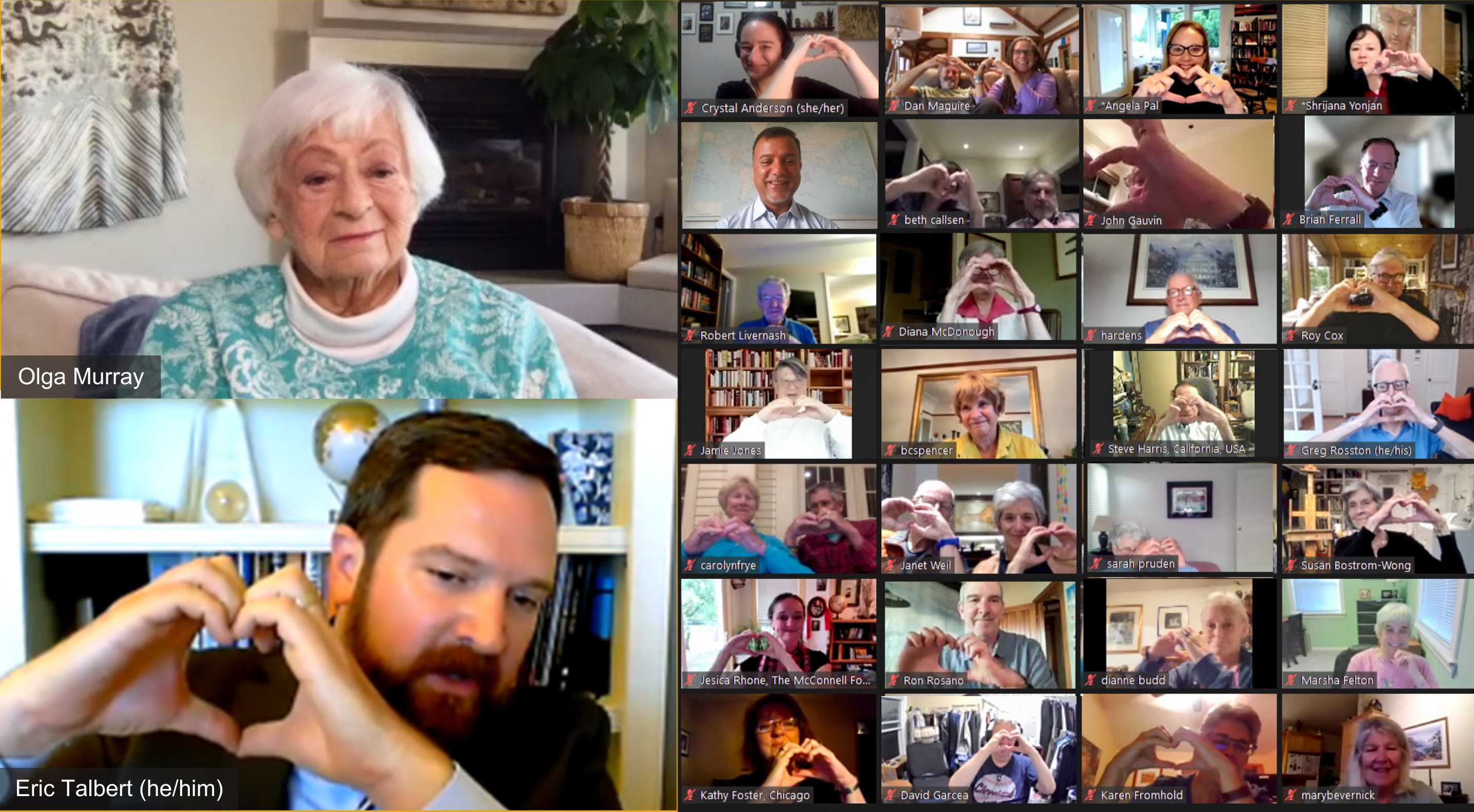
Founder’s Day 2022—held over Zoom on Tuesday, June 7th, 2022—was a tremendous success!
Thank you to everyone who signed in live to commemorate another remarkable year of transformative impact in Nepal! Our global team deeply appreciates your many messages of congratulations and support. Olga, especially, is touched by the well-wishes in celebration of her life and work.
The team in Nepal, led by Som Paneru, was so delighted to see everyone’s excitement during the event. They were deeply gratified by the warmth and encouragement our community shared with guest speakers Jeena Maharjan and Bishnu Chaudhary. If you were unable to attend Founder’s Day in person (or if you would like to share the celebration with a friend or over social media), the full event is now available through our YouTube channel.
It was so wonderful to see our remarkable community of loving supporters from across the world, current and former staff members (especially those in Nepal!), and program graduates. Meeting together in this way is such a joy—and we are so grateful you joined in the fun.
Thank you to everyone who registered, attended, participated, and donated. Thanks, too, to anyone who invited a friend or spread the word on social media. A special thank you goes to co-hosts Shrijana Singh Yonjan and Dr. Angela Pal; videographers Roy Cox and Robin Mortarotti; and guest speakers Jeena Maharjan and Bishnu Chaudhary for helping shape the inspiring presentations; author and philanthropist Isabel Allende for her beautiful birthday wish, and to the volunteers, board members, advisory board members, and staff working behind the scenes. And of course, thank you to Olga Murray and Som Paneru for giving us so much to celebrate!
Olga’s 97th Birthday Goal
We are so excited to share that we exceeded our Founder’s Day 2022 fundraising goal of $97,000 in honor of Olga’s 97th birthday! This includes donations, pledges, and auction bids.
Thank you to each wonderful supporter who donated in honor of Founder’s Day 2022! Early gifts carried us over halfway to our goal, and the remarkable generosity during our event carried us well over our goal amount. Your gifts will make a transformative difference providing Education, Health, Shelter, and Freedom to children in Nepal!
The warmth, love, and kindness of our incredible community is truly humbling for all of us on NYF’s global team. Perhaps most of all, we are humbled by the trust you place in us with each thoughtful contribution to the causes we share.

Thank you!
Thank you for helping our global team transform lives every day in Nepal. Whether your focus is nutrition programming, girls’ education, vocational and entrepreneurship training for young adults, childhood mental health, or safe housing for kids, YOUR SUPPORT makes a tangible, positive difference in the lives we touch.
Thank you for joining us in daring to tackle some of the toughest, most entrenched challenges facing the children we serve.
Your love is providing Education, Health, Shelter, and Freedom to Nepal’s newest generation—and graduates from our programs are proving that your #LoveWorks. Dhanyabad!
If you have not yet fulfilled your Founder’s Day pledge, or if you would like to make another thoughtful gift, please do so here.
Lucky Winners
Our U.S. team is contacting auction winners and pledge raffle winners. If you have any questions about this process, please reach out to us by emailing info@nepalyouthfoundation.org. You can also call our office using the number on our contact us page.
The Caste Equality Project & Educating Dalit Lawyers
A highlight of Founder’s Day 2022 was our announcement of our ambitious new program, the Caste Equality Project!
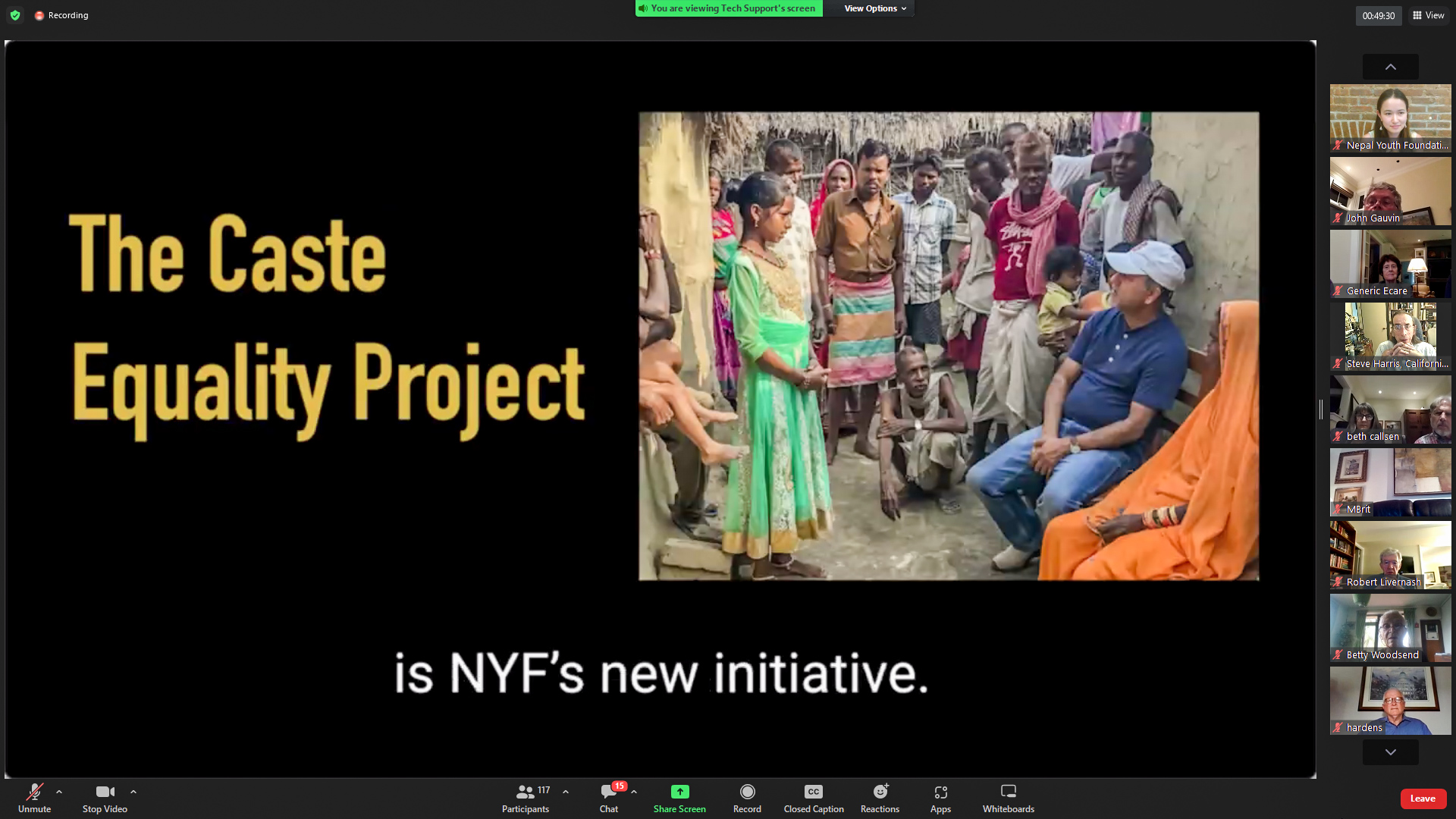
Phase 1: Educating Dalit Lawyers launches the summer of 2022. The first group of 15 students will enter Kathmandu law schools at the beginning of the 2022-2023 academic year. Olga is ecstatic about the potential these young people have to change their world for the better. Likewise, Som and his team are eager to scale our work in the coming years.
We’ve now published the program pages for these exciting projects (linked above). Meanwhile, we will also be sharing photos, stories, and information about our progress as this information becomes available.
Please keep an eye out for updates right here on our blog about all our programs. We’re so excited to share more with you soon about the impact your support is having on the lives of so many!
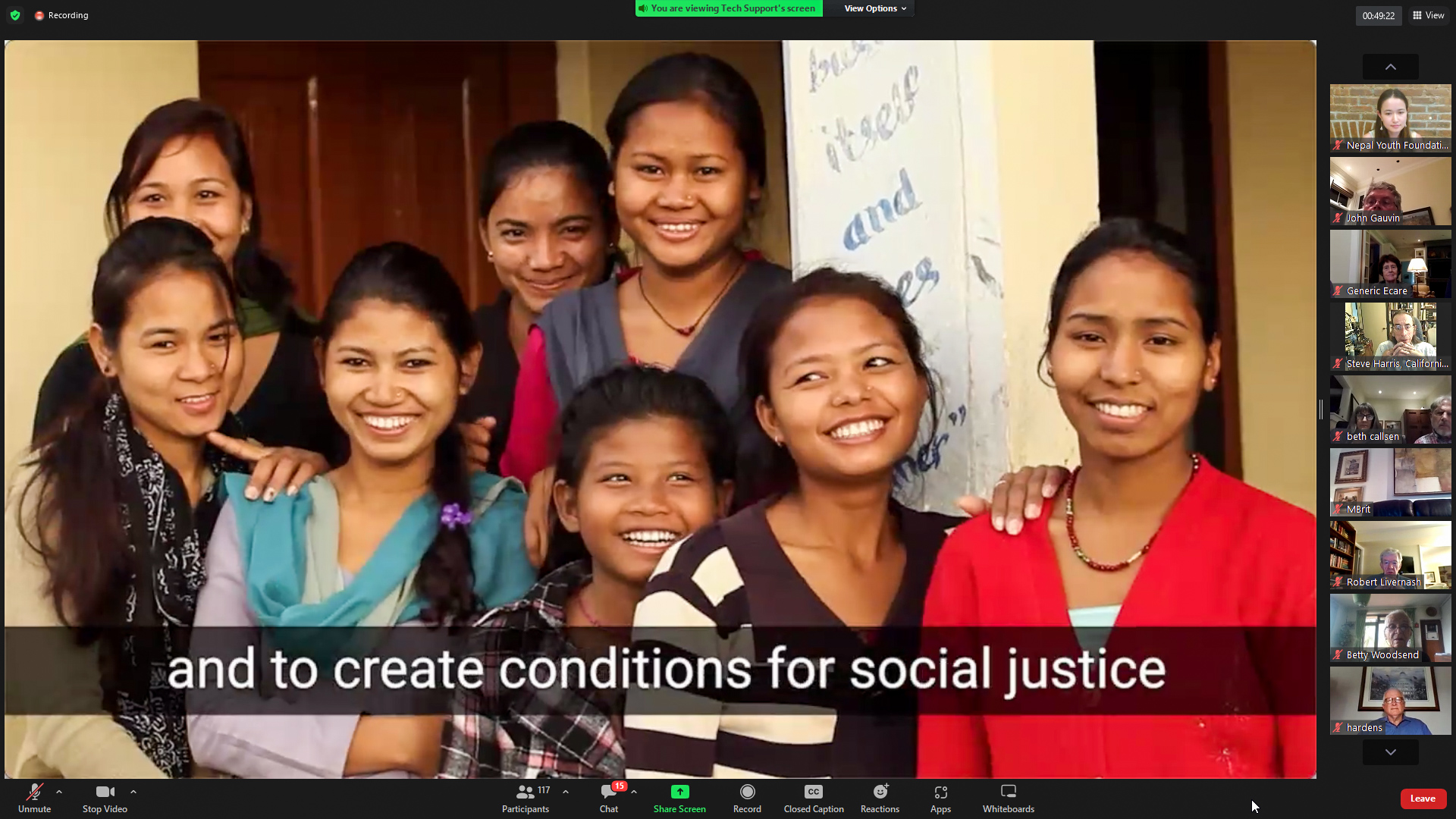
Dhanyabad!
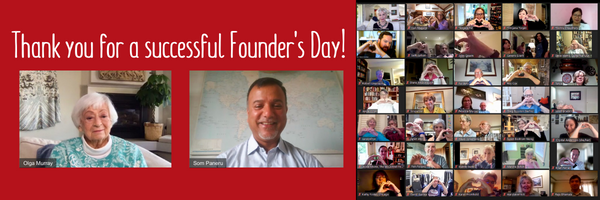
Remembering Alison Wright (1961-2022)
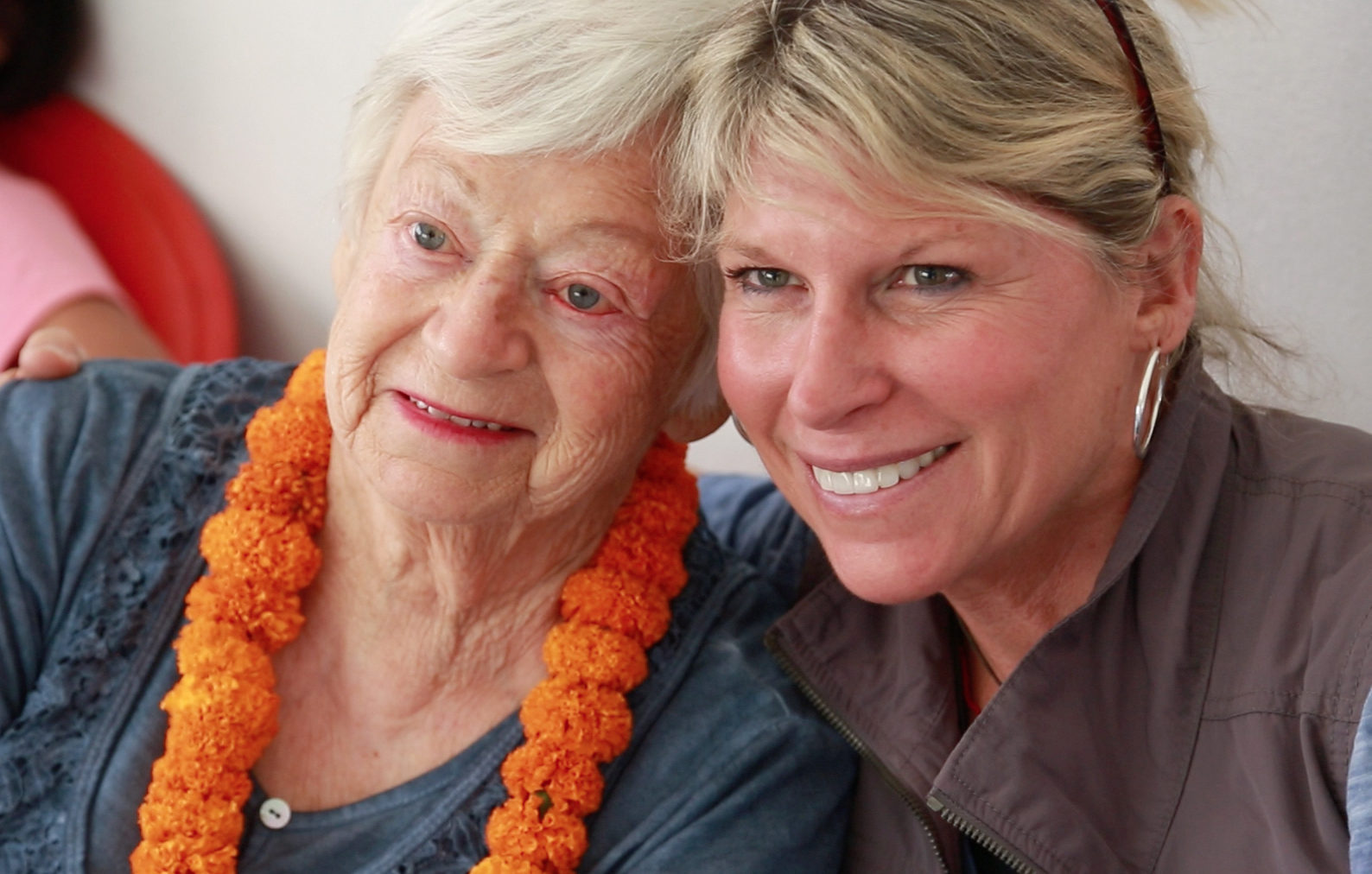
Written by: NYF Founder Olga Murray
I am so saddened by the death of my old friend Alison Wright, who died in mid March in Portugal while on a scuba diving expedition in the Azores. Alison was the most adventurous, fearless person I have ever known, with a passion to use her superb photographic talents to better the world.
She traveled to countries I had never heard of and packed more into her life than I thought was possible. From photographing nomads hunting with falcons in Mongolia to living with sex workers in Mumbai to gain their trust before photographing them, to camping out with a pygmy tribe in the Kalahari desert, she seemed impervious to the hardships which would have given pause to an ordinary human being.
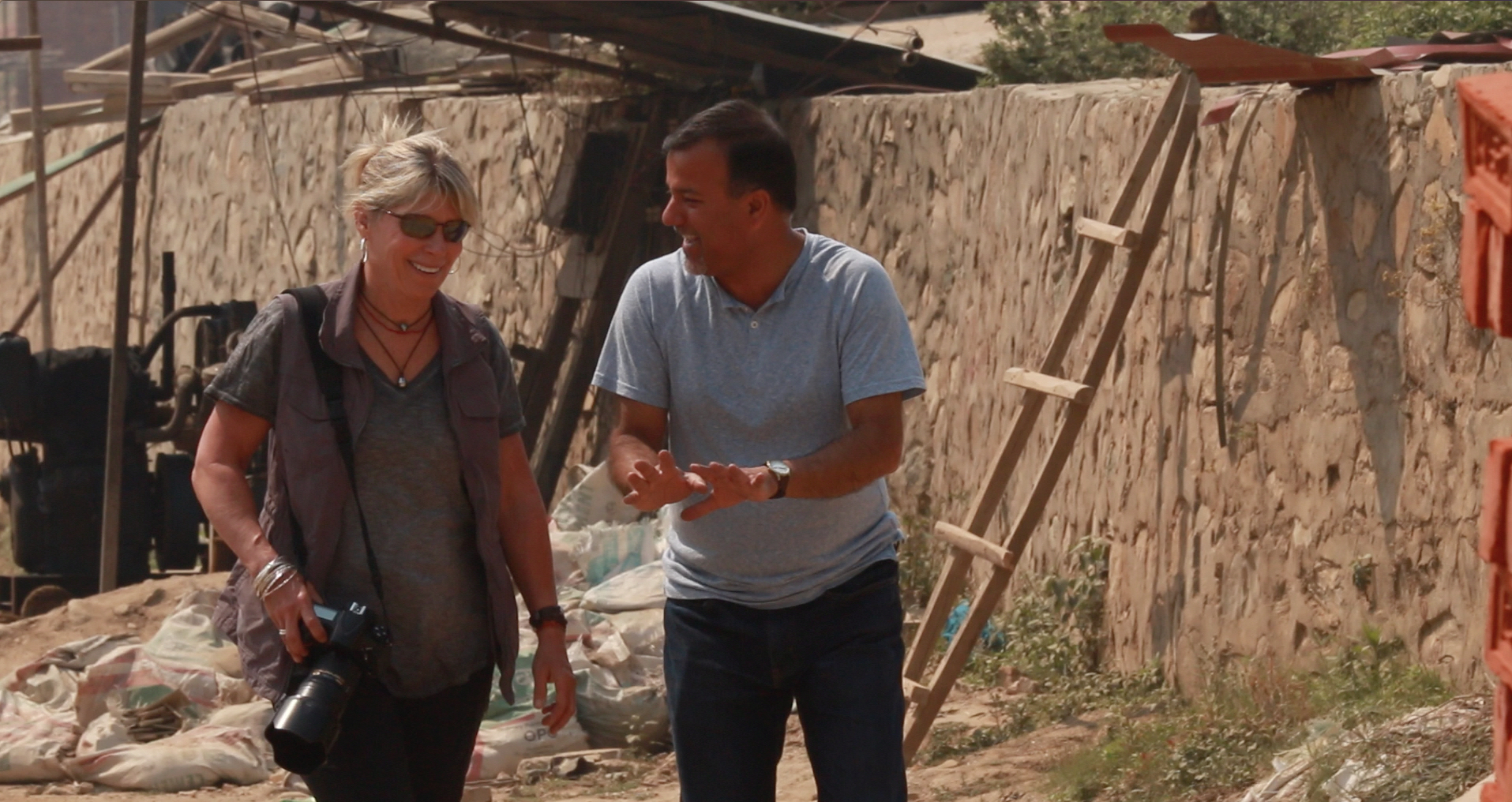
But above all, she was passionate about using her incredible talents to better the human condition. She conducted workshops in using photography to effect social change. She started her own foundation to provide health care to a village in Laos, where she almost died after a truck rammed into a bus in which she was a passenger. Alison was a great friend of NYF and took some of the most beautiful and impactful pictures of our projects and our children.
We met more than 30 years ago in Nepal. She visited me there many times, and we had a deep and loving friendship. I will always keep in my heart her love of life and contagious, generous spirit.
At my 95th birthday celebration, Alison Wright presented a video she made for me as a birthday gift. You can watch it below.
NYF’s partnership with One Day’s Wages: A successful Vocational Education project!
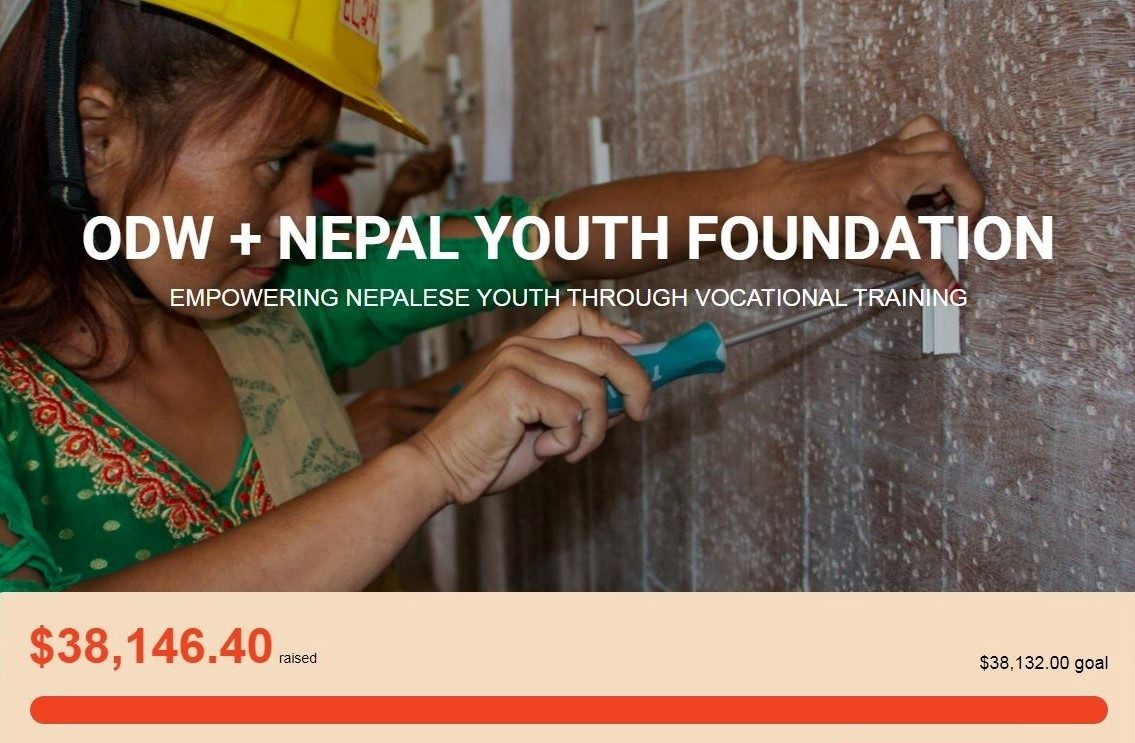
In late 2019, NYF launched a matching campaign with One Day’s Wages to fund 52 students in our Vocational Education & Career Counseling program. Thanks to support from friends like you, we were able to meet our fundraising goal— and we received a generous matching grant from One Day’s Wages to complete this project in 2020.
Though the pandemic caused a delay in starting and completing this vocational education project, we are happy to finally share how successful it ended up being. We are also incredibly grateful for the One Day’s Wages team for being so patient, flexible, and encouraging while working with us on this project as we navigated COVID-19.
The Vocational Education Training Course
This project funded a 12-week training course for 52 students in our Olgapuri Vocational School training program. 31 of these students graduated from the electrical course in Barbardiya Municipality, and 21 from the plumbing course in Bhanu Municipality.
Our original plans were to invite our students from multiple regions in Nepal to Olgapuri Vocational School in Kathmandu. However, NYF had to shift the program to a satellite model due to COVID-19. In this new set-up, our incredible teachers transported their equipment to villages in Barbardiya and Bhanu Municipalities to self-isolate before teaching the twelve-week course to local young adults. These satellite trainings were successful and eagerly received by individual students and communities. As a result, we are working to identify ways to make them a part of our regular programming.
During the training, our students received hands-on instruction and practice (approximately 80% of class time) as well as theoretical material (20% of class time). Theoretical elements included relevant course reading, as well as health, first-aid, and safety training. It also included entrepreneurship development, and life skills components like goal setting and decision making, communication, basic computer use, and job search skills.
In July 2021, our 52 students graduated.
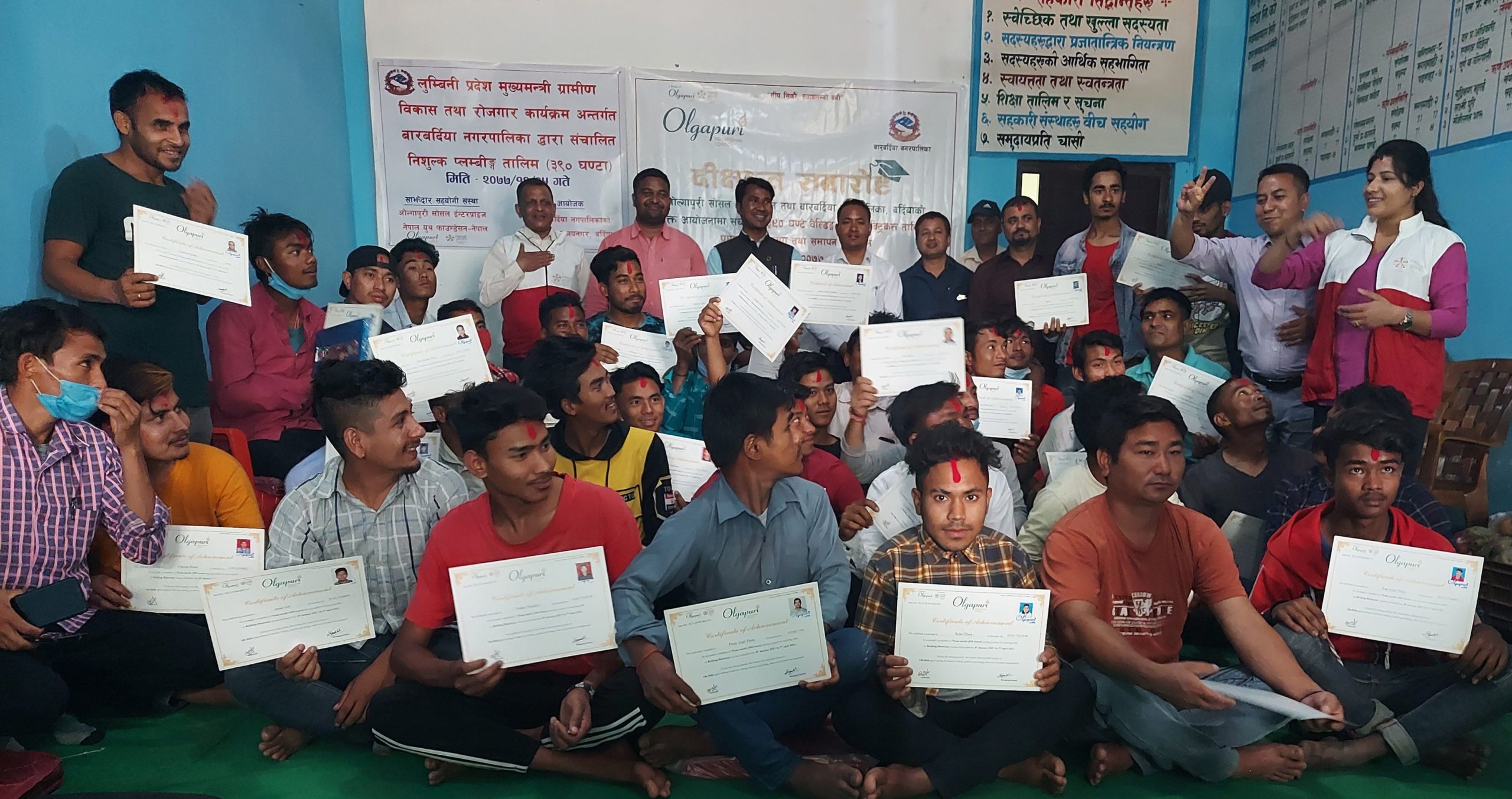
As we come up on one year since the vocational education courses began, we’re thrilled to share the positive impact this project had on its students, their families, and their communities.
Community Impact
Much to the benefit of their communities, the majority of our electrical program graduates have decided to work in their hometowns.
Before this program, electricians and their labor were very expensive. That made electricity unreliable at best (and thus more of a luxury than a real utility), and dangerous at worst (in the event someone decided to attempt repairs on their own, without training). NYF’s electrical graduates discovered quickly that there was plentiful work available for them close to home.
Local construction businesses can now take on new projects with greater confidence, since now they know there are skilled, trusted technicians nearby to accomplish this work. This, plus the affordability of services, has increased the demand for construction projects in the community. This is already resulting in an economy where local money continues to support local businesses. Even as the COVID crisis drags on, the standard of living is on the rise in the areas that have received these training courses.
Community members, too, soon learned that they can now receive prompt, affordable, high-quality electrical services from local young people who share their dialect.
Some of the plumbers and electricians in these two courses have already established their own small businesses. They’ve taken on apprentices from among the local young adults — creating new jobs and new experts.
We’re also proud that local governments and construction companies in nearby areas are requesting more opportunities for vocational education trainings. Even with this increase of new skilled workers, there is still enormous demand for exactly these kinds of experts. Nepal’s infrastructure is developing rapidly, and empowering local young people with the skills they need to provide these services will do tremendous good across the country.
One House, One Tap: Bhanu Municipality
“One House, One Tap” is a country-wide government project that provides municipalities in Nepal with the funds to install running water in each household. This project had been of interest to local officials of Bhanu Municipality for a long time. However, there were not enough skilled plumbers in their region to provide the required labor. Thanks to this campaign, the region now has plenty of new plumbers. This has allowed Bhanu Municipality to finally take advantage of the One House, One Tap project!
We’re thrilled to share that our plumbing graduates are involved in installing running water to 55 households in Yansing Village and 32 households in Chokot. By February 2022, 12 graduates had installed and fitted the main underground pipeline to one of the villages. They also built two entire water reservoirs nearly to completion.
Until this time, Yansing Village in Bhanu Municipality only contained 7 taps total, which had been connected to a small natural spring at the top of a nearby hill (rather than to larger-scale infrastructure, as the new ones are). Individuals—most of whom live about 15 minutes from the nearest tap on foot—fetched water from these public taps on a rotating basis. Since it is so difficult to bring this water home, most families reserved it mostly for cooking and drinking purposes only, with hygiene being neglected.
The arrival of plumbers in this region is having a near-immediate, widespread public health impact. With tap water available in each household, families will be better able to maintain far better personal hygiene. This will help slow the spread of disease and increase their available time and energy for other tasks.
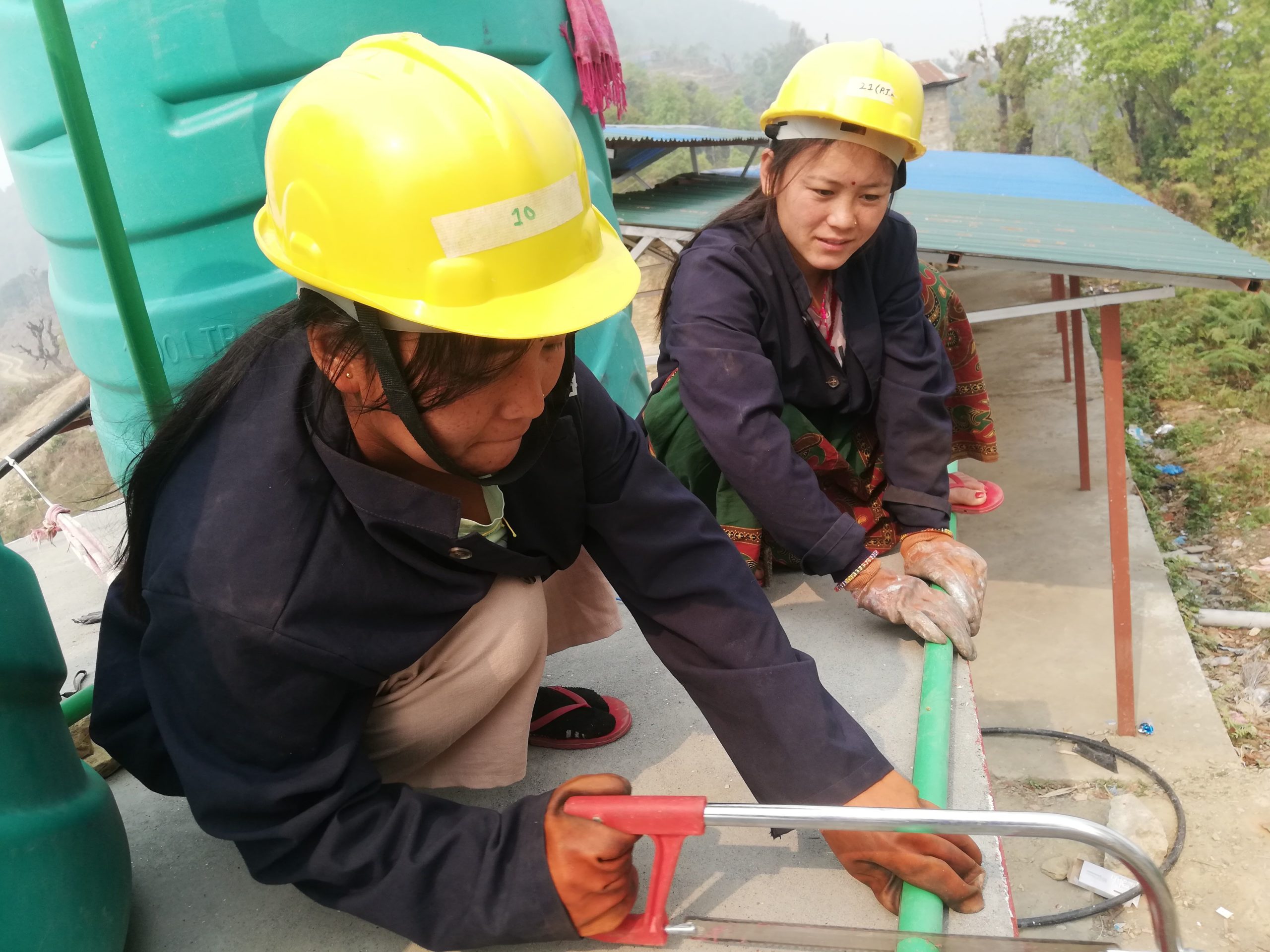
Individual Impact
Upendra G.
Upendra is a village social worker in Bhanu Municipality. He was enthusiastically involved in bringing the NYF training to the area. During the training period, he provided snacks for the trainees.
Upendra was one of the first people to hire the training graduates. He asked four of them to construct a full bathroom at his home. This included a sink, a toilet, a shower, drainage, and tiles, plus a tap for washing muddy feet.
Upendra’s bathroom is in a standalone building near his fields. It is also attached to a 1,000-liter water tank. His is now one of the best restrooms in the entire village. Soon after completing the construction, Upendra invited the local mayor to view this restroom.
“The mayor was surprised to see such a good toilet in the village,” Upendra said happily. “I shared how thorough and excellent the NYF training is, and how it has helped transform the youth with strong skills. NYF’s training has really been transformative for the entire village.”
Girija G.
Girija is a young NYF plumbing course graduate from Vanu Municipality. He lives with his family of lifelong subsistence farmers. When he married last year, he started searching for an additional livelihood to ensure the growing family could improve their self-sufficiency. He worried he might have to leave the village, or even the country, to find work.
Following the NYF plumbing course, Girija has good-paying work here in his own village and in villages nearby. This means that his family has the benefit of both his income and his presence. He is currently balancing plumbing work with farming to maximize the effectiveness on his family’s farm. This is an enormous gift to his parents, who are aging, and to his wife and their future children. Even working part-time, Girija is bringing in about 20,000 Nepalese rupees per month ($172), which is over 50% more than minimum wage for a full-time job in Nepal.
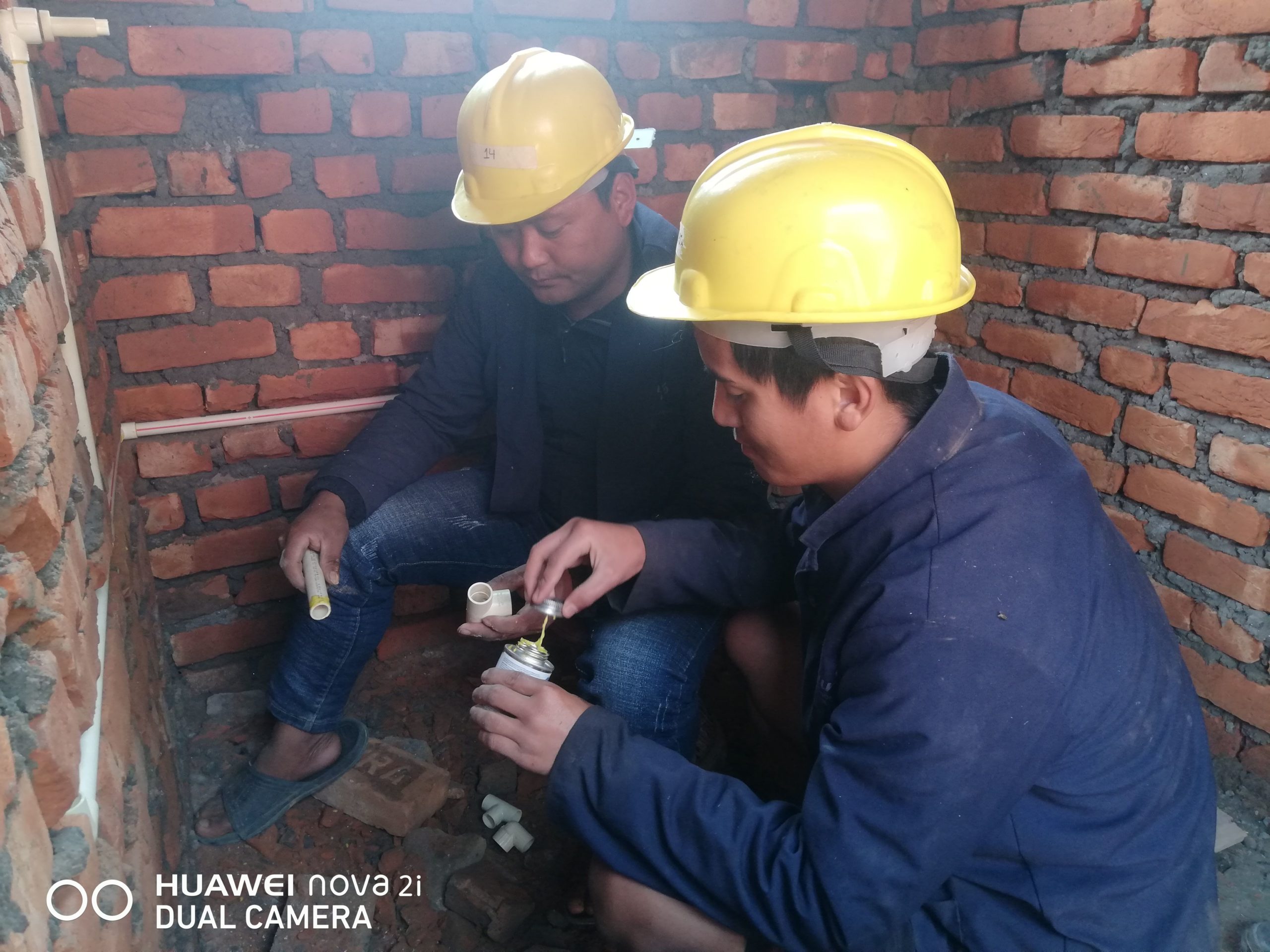
Girija’s parents are bursting with pride at their son’s accomplishments. He has become a huge credit to the village and is providing for the family in ways they only dreamed possible—everything a parent in Nepal dreams of. Meanwhile, Girija’s wife is happy about the family’s increased stability, even in this time of uncertainty with the COVID pandemic.
With this money, Girija and his family are excited about future possibilities. A potential full bathroom of their own, for example, which would immediately improve their family’s health. They may use some funds to purchase meat, dairy, or other staples to supplement their home-grown diets. They may upgrade some farming equipment, invest in other housing upgrades, or begin saving for schooling for their future children. This vocational education course has opened future possibilities for them all.
From all of us at NYF, thank you and dhanyabad!
We cannot overstate the continuing economic impacts of this pandemic in Nepal. Now more than ever, the youth of Nepal need viable job readiness training and career investment to allow the country to recover. Your loving support makes such a difference for these young adults and their communities!
Presidential Medal of Freedom: Help Nominate Olga!
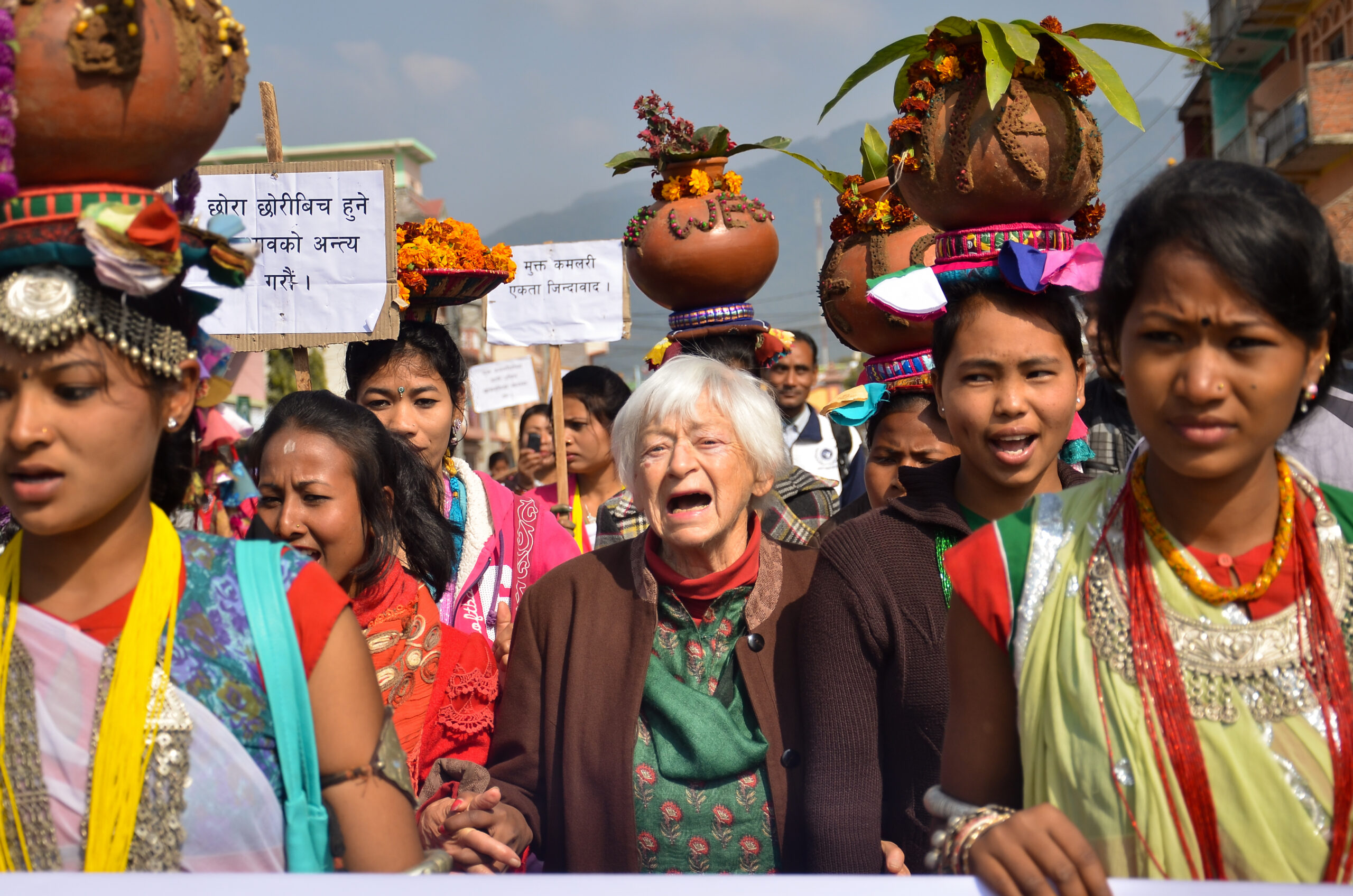
Presidential Medal of Freedom
The Presidential Medal of Freedom is the highest civilian honor in the United States. It is bestowed by the President on individuals who have made “an especially meritorious contribution to the security or national interests of the United States, world peace, cultural or other significant public or private endeavors.”
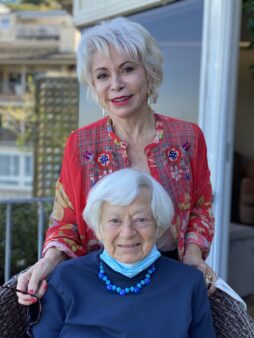
Recipients of the award include artists, scientists, inventors, activists, writers, diplomats, pioneering figures, politicians, athletes, journalists, philanthropists, and more – including beloved friend of NYF Isabel Allende!
In early March, Isabel reached out to Congress to tell them about Olga’s incredible work in Nepal and to recommend her for this special honor.
Isabel thinks Olga deserves the Medal as well – and so do we!
National Recognition
Recipients of the Presidential Medal of Freedom are honored as individuals, but the celebration also shines a national spotlight on the work they have done and continue to do.
NYF’s work is unique in so many ways—and our long-term, committed approach could inspire many more organizations doing similar work in other countries. We hope that by bestowing this much-deserved honor on Olga and her work, President Biden will also draw valuable attention to NYF. This will not only allow us to expand our own work more effectively, but will also allow other child-focused organizations around the world to borrow ideas from our transformative community-centered programs.
What You Can Do
There is no official nomination procedure for the Presidential Medal of Freedom, and each White House administration handles the process differently. Recipients are selected by the President of the United States, either on the President’s own initiative or based on recommendations.
We are taking a broad approach by letting our senators know about Olga’s incredible story and requesting that they recommend her name to President Joe Biden as a candidate for the Presidential Medal of Freedom.
If you are a US citizen or resident and agree that Olga deserves this prestigious award, please write to your senators to tell them so! If you choose to participate in our campaign to nominate Olga, please let us know so we can notify you of any response we receive.
Instructions to Nominate Olga
We have prepared this template letter to make the process as simple as possible. If you use this letter, submitting this request to your senator should only take a few moments.
If you have more time and would like to craft your own letter, we encourage this as well! Letters from the heart can have a tremendous impact. Please feel free to adjust our template as much or as little as you wish.
Find your senator’s contact information.
(1) Visit https://www.senate.gov/senators/senators-contact.htm to find the contact information for your senators. Once you have selected your state, mailing addresses are available for each senator.
- Senators often prefer to receive correspondence over the web (and receive it more quickly this way). You can find your senators’ preferences by clicking on their photo, which will take you to their official webpage. Clicking “Contact” will bring up details about reaching your senator.
Use our template!
(2) Download our template letter by clicking here.
- If you are planning to mail your letter in hard copy:
- Add your address to the top right corner so your senators know you are one of their constituents. Add the date and your senator’s address. Include your senator’s name to the salutation.
- If desired, make any personal adjustments to the letter.
- Type your name at the bottom of the letter, then print, sign, and send.
- If you will send your letter as an email:
- If your senator’s contact page prompts you to fill out a form, please follow the instructions on the form. You can copy/paste from the letter where appropriate. This form may indicate a word or character limit. If it does, please click here to download a condensed version of our letter.
- If you are prompted to send an email from your personal email account, be sure to add a sentence to the letter indicating that you live in the state that senator represents.
- Type your name at the bottom of the letter, then print, sign, and send.
- Don’t forget to add your name to the bottom of the letter.
We want to thank you!
(3) If you nominate Olga, please let us know once you have sent your letter(s). You may let us know below, or email us at info@nepalyouthfoundation.org or call us at 415-331-8585.
Next Steps
If you would like to write directly to President Joe Biden or Vice President Kamala Harris with a recommendation to nominate Olga, you may certainly do so!
Contact information for the White House is available here: https://www.whitehouse.gov/get-involved/write-or-call/
The White House’s online form has a character limit, so please use our condensed letter as a guide.
If you happen to personally know someone who works in the White House or in a similarly-connected position, they may also be able to provide a recommendation. Please let us know if there is anything our team can do to help you share Olga’s remarkable work with these connections.